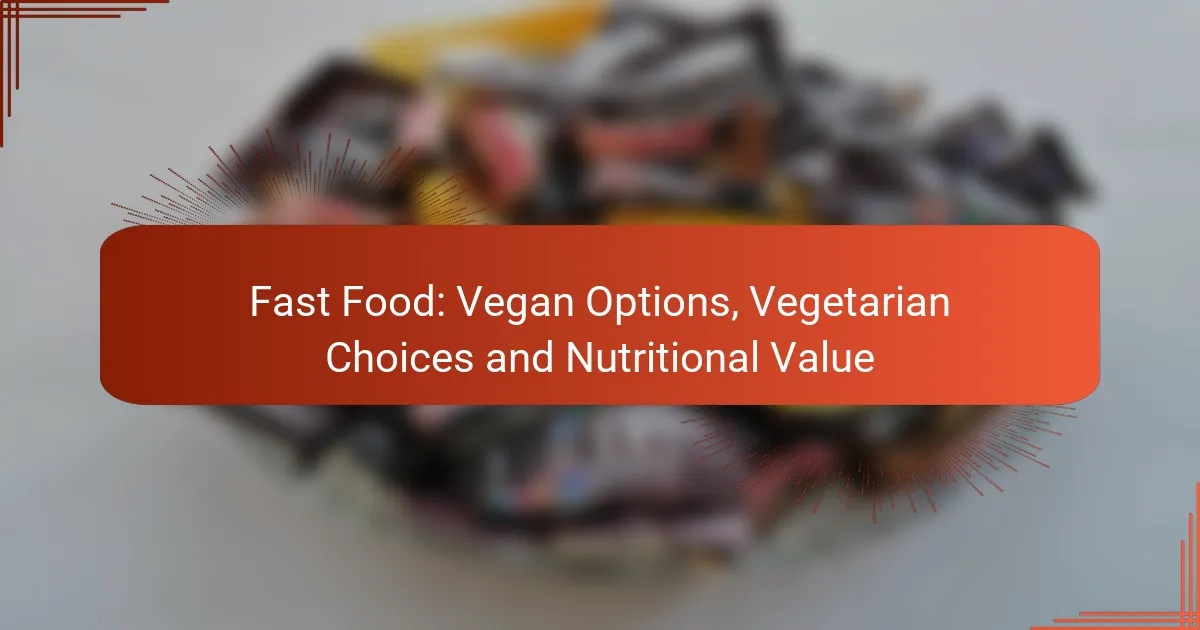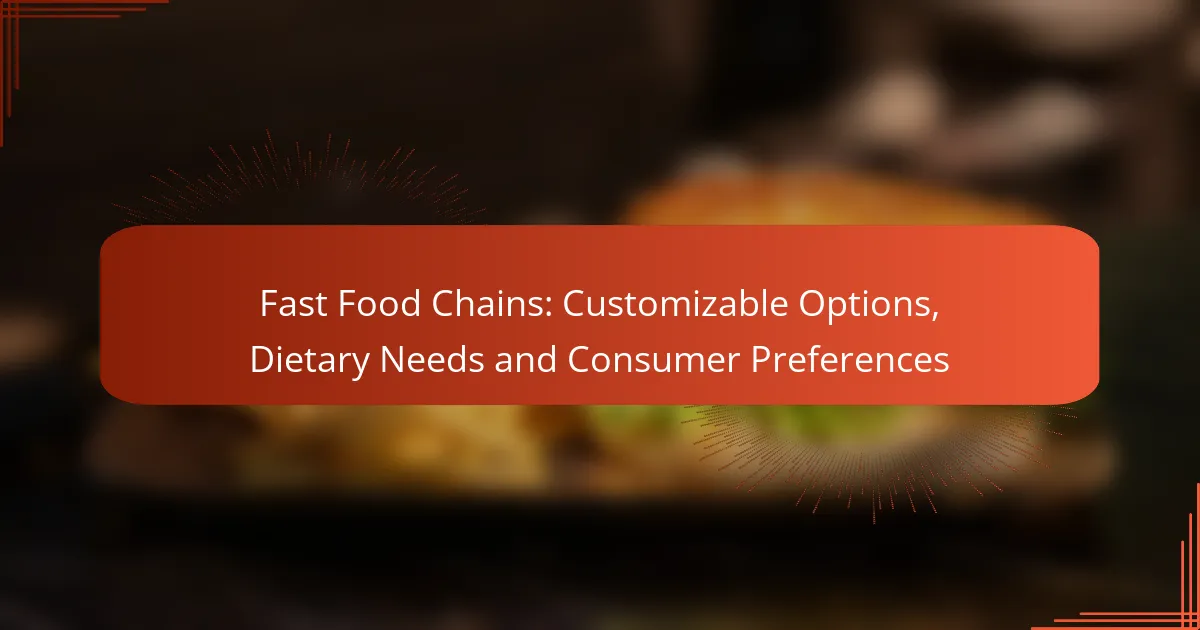As the demand for plant-based meals continues to rise, many fast food chains are expanding their menus to include a variety of vegan and vegetarian options. These meals not only cater to diverse dietary preferences but also offer a range of flavors and nutritional profiles. By understanding the differences in caloric content, protein sources, and overall nutritional value, consumers can make informed choices that align with their health goals while enjoying convenient dining experiences.
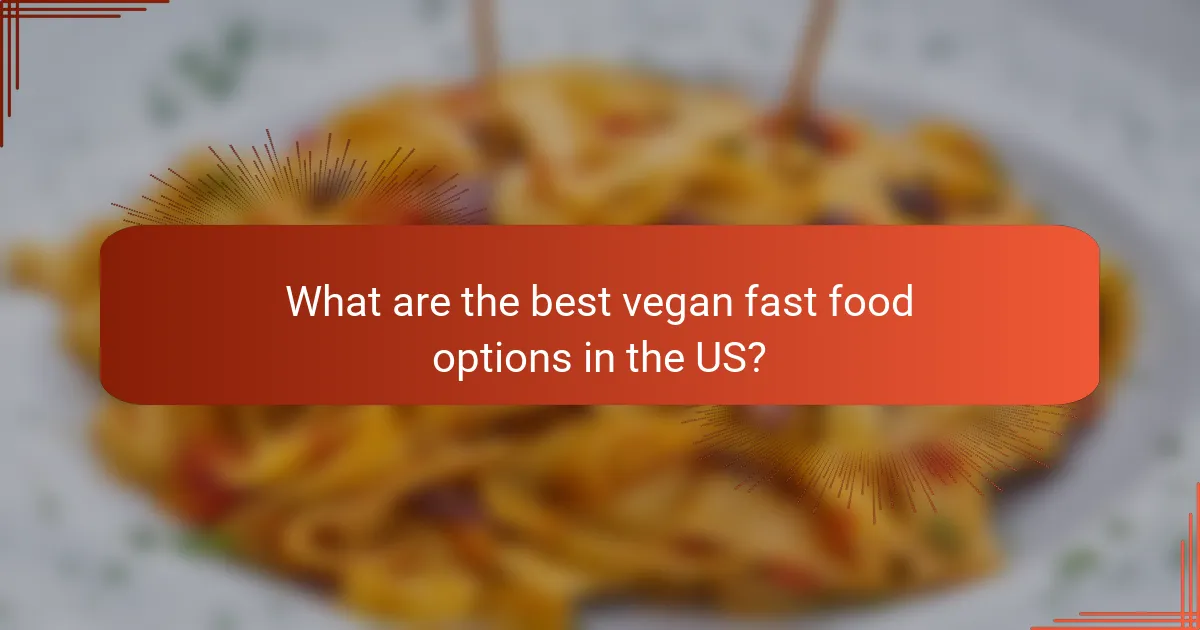
What are the best vegan fast food options in the US?
The best vegan fast food options in the US include a variety of flavorful and satisfying meals that cater to plant-based diets. Popular choices feature innovative ingredients that provide taste and nutrition while being widely available across many fast food chains.
Chipotle’s Sofritas
Chipotle’s Sofritas is a popular vegan option made from organic tofu that is crumbled and braised with spices and chipotle peppers. This dish can be customized in a burrito, bowl, or taco format, allowing for a variety of toppings such as guacamole, salsa, and beans.
When ordering, consider adding extra vegetables or a side of brown rice for added nutrition. Chipotle’s commitment to using non-GMO ingredients enhances the appeal for health-conscious consumers.
Del Taco’s Beyond Meat Tacos
Del Taco offers Beyond Meat Tacos, which feature plant-based protein that mimics the taste and texture of traditional beef. These tacos come with fresh toppings like lettuce, tomatoes, and cheese, making them a satisfying choice for vegans.
For a healthier option, you can request no cheese and load up on additional veggies. Del Taco also provides a variety of salsas to enhance flavor without adding significant calories.
Subway’s Veggie Delite
Subway’s Veggie Delite is a customizable sandwich packed with fresh vegetables like lettuce, tomatoes, cucumbers, and peppers. This option allows you to choose your bread and condiments, making it easy to create a meal that suits your taste.
To boost the nutritional value, consider adding avocado or opting for whole grain bread. Be mindful of sauces, as some may contain animal products, so check for vegan-friendly options.
Starbucks’ Vegan Protein Box
Starbucks’ Vegan Protein Box is a convenient option that includes a variety of plant-based snacks such as hummus, fruit, and nut mix. This box is perfect for a quick meal on the go and provides a balanced mix of protein and healthy fats.
Pair it with a coffee or tea for a complete snack. Always check for seasonal variations, as Starbucks occasionally updates their menu with new vegan offerings.
Wendy’s Black Bean Burger
Wendy’s Black Bean Burger is a hearty option made with a black bean patty that is both filling and flavorful. It can be ordered with various toppings, including lettuce, tomato, and onion, making it a versatile choice for lunch or dinner.
For a healthier meal, consider skipping the cheese and mayonnaise. Wendy’s also offers a side of apple slices or a garden salad for a more balanced meal.
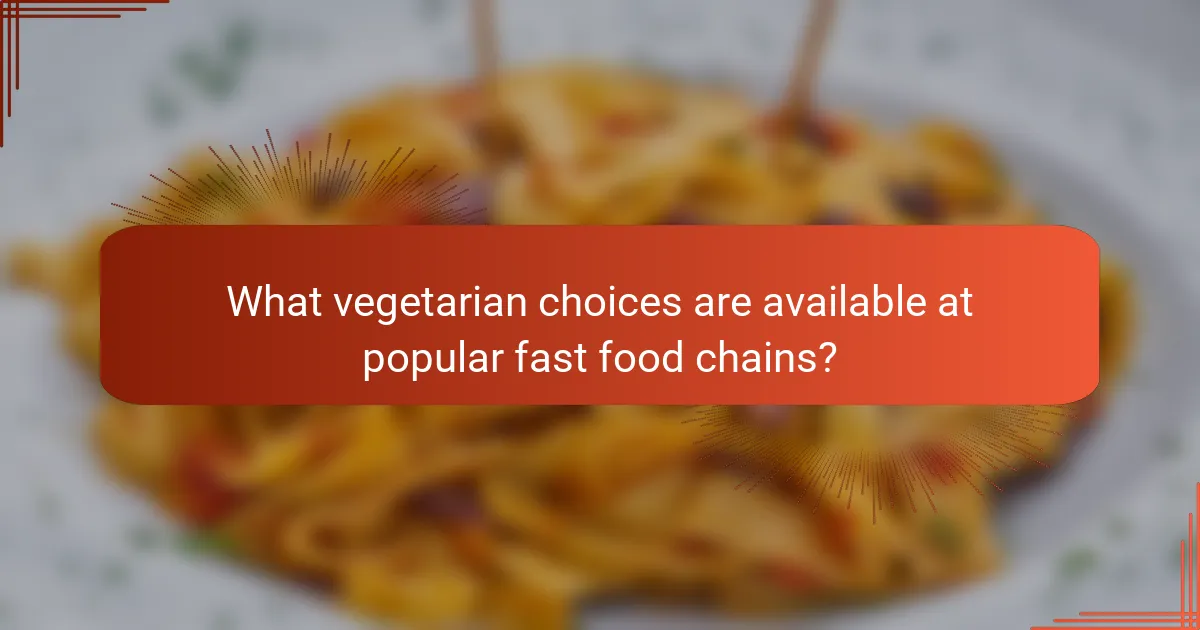
What vegetarian choices are available at popular fast food chains?
Many popular fast food chains now offer vegetarian options to cater to the growing demand for plant-based meals. These choices vary widely in flavor and nutritional value, making it easier for vegetarians to find satisfying meals on the go.
McDonald’s McVeggie
The McVeggie is McDonald’s answer to vegetarian dining, featuring a breaded vegetable patty made from a blend of vegetables and spices. This burger is served with lettuce, tomato, and mayonnaise on a sesame seed bun, providing a familiar fast food experience.
When choosing the McVeggie, consider that it may not be suitable for strict vegans due to the mayonnaise. Additionally, check for local availability, as this item may not be offered in all regions.
Burger King’s Impossible Whopper
Burger King’s Impossible Whopper is a plant-based burger that mimics the taste and texture of beef, made with Impossible Foods’ signature patty. It is topped with lettuce, tomato, pickles, ketchup, and mayonnaise, served on a sesame seed bun.
This option is a popular choice for vegetarians and flexitarians alike, but be aware that it is cooked on the same grill as meat products, which may be a concern for strict vegetarians. Requesting no mayonnaise can make it fully vegan.
KFC’s Vegetarian Burger
KFC offers a Vegetarian Burger that features a plant-based patty designed to deliver a satisfying crunch. This burger is complemented by fresh lettuce and mayonnaise on a soft bun, providing a familiar fast food flavor.
Keep in mind that KFC’s vegetarian options may vary by location, and the vegetarian burger could be fried in oil shared with meat products. Always check with staff to confirm preparation methods if this is a concern.
Panda Express’ Eggplant Tofu
Panda Express serves a flavorful Eggplant Tofu dish, which combines tender tofu with eggplant, bell peppers, and a savory sauce. This dish is a great vegetarian option that highlights Asian flavors and is often served with steamed rice or chow mein.
This meal is a solid choice for those looking for a hearty vegetarian option, but be cautious of portion sizes, as it can be high in sodium. Pair it with a side of vegetables for a more balanced meal.
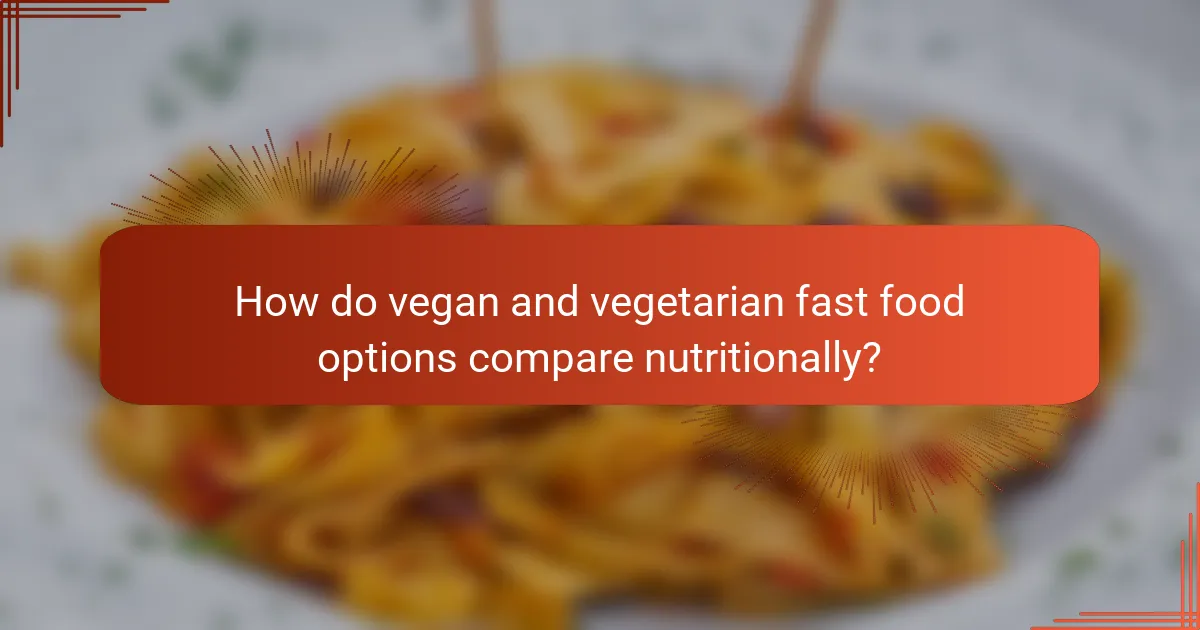
How do vegan and vegetarian fast food options compare nutritionally?
Vegan and vegetarian fast food options differ significantly in their nutritional profiles, particularly in terms of caloric content, protein sources, and fat and carbohydrate breakdown. Understanding these differences can help consumers make informed choices based on their dietary needs.
Caloric content differences
Vegan fast food options often contain fewer calories than their vegetarian counterparts, primarily because they lack cheese and other dairy products. For instance, a vegan burger might have around 300-500 calories, while a vegetarian burger with cheese could range from 400-700 calories. When selecting fast food, it’s essential to check the nutritional information to make choices that align with your caloric goals.
Protein sources in vegan vs vegetarian
Vegan fast food typically relies on plant-based proteins such as beans, lentils, and soy, while vegetarian options may include dairy and eggs as additional protein sources. A vegan wrap might provide about 15-25 grams of protein, whereas a vegetarian wrap with cheese could offer 20-30 grams. For those focused on protein intake, understanding these sources can guide better meal selections.
Fat and carbohydrate breakdown
The fat content in vegan fast food is often lower, as it excludes animal fats found in dairy and meat. However, some vegan options can be high in saturated fats if they contain coconut oil or processed ingredients. Carbohydrates in both diets can vary widely, with many vegan options featuring whole grains and legumes, which provide fiber. Checking labels for fat and carbohydrate content can help maintain a balanced diet while enjoying fast food.
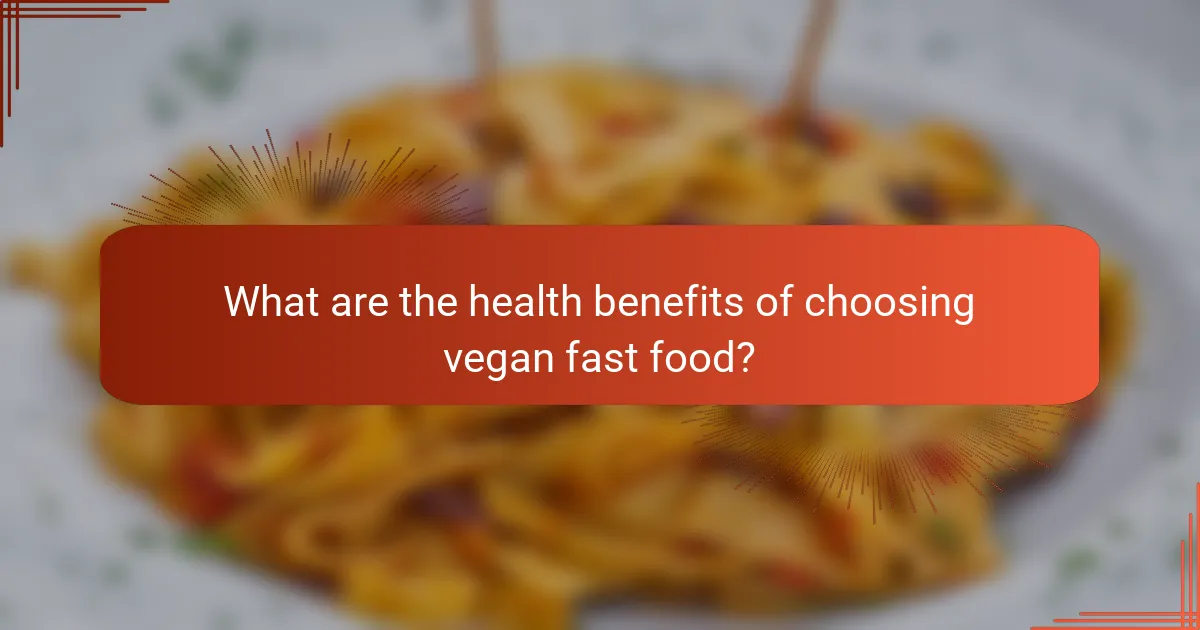
What are the health benefits of choosing vegan fast food?
Choosing vegan fast food can lead to several health benefits, primarily due to the absence of animal products and the inclusion of plant-based ingredients. These options often promote better overall health by lowering cholesterol, increasing fiber intake, and reducing the risk of chronic diseases.
Lower cholesterol levels
Vegan fast food typically contains no cholesterol since it excludes animal products. Foods rich in plant-based ingredients, such as legumes, whole grains, and vegetables, can help maintain lower cholesterol levels. Regular consumption of these foods can contribute to heart health and may lead to a reduction in LDL (bad) cholesterol.
To maximize this benefit, opt for items like bean burgers or salads topped with avocado and nuts, which are both nutritious and satisfying. Avoid fried options that may contain unhealthy fats, as they can counteract the cholesterol-lowering effects.
Increased fiber intake
Vegan fast food is often high in dietary fiber, which is essential for digestive health. Foods such as whole grains, fruits, and vegetables are common in vegan options and can help improve gut function and promote regular bowel movements. A higher fiber intake is associated with better satiety, which can aid in weight management.
When selecting vegan fast food, look for items that include whole grains like quinoa or brown rice, and plenty of vegetables. Aim for meals that provide a good balance of fiber, ideally exceeding 5 grams per serving for optimal benefits.
Reduced risk of chronic diseases
Adopting a vegan diet, even occasionally through fast food choices, can lower the risk of chronic diseases such as heart disease, diabetes, and certain cancers. Plant-based diets are rich in antioxidants and phytochemicals that support overall health and may help combat inflammation.
To leverage this benefit, choose meals that are colorful and diverse, incorporating a variety of vegetables and whole foods. Pay attention to sodium levels in processed vegan items, as high sodium can negate some health benefits. Aim for options that are lower in salt to maintain heart health.

What should you consider when selecting vegan or vegetarian fast food?
When choosing vegan or vegetarian fast food, consider ingredient quality, nutritional content, and preparation methods. Understanding these factors can help you make healthier and more informed choices that align with your dietary preferences.
Ingredient transparency
Ingredient transparency refers to how openly a fast food establishment shares the details about what goes into their vegan and vegetarian options. Look for restaurants that provide clear information about their ingredients, including potential allergens and additives.
Many fast food chains now offer detailed ingredient lists on their websites or in-store menus. This can help you identify whether the food meets your dietary needs, such as being free from animal products or containing minimal processed ingredients.
When selecting items, prioritize establishments that highlight whole food ingredients over heavily processed ones. For example, a veggie burger made from black beans and quinoa is often a better choice than one filled with artificial fillers and preservatives.
